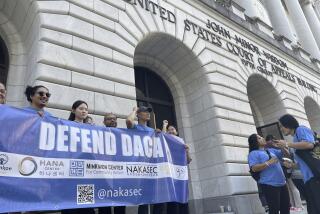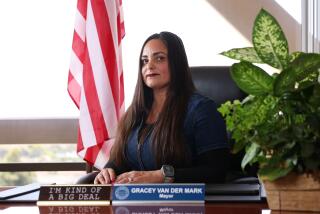U.S. Sued on Anti-Gay Military Policy
BOSTON — Twelve gays and lesbians brought suit Friday against the federal government, seeking to overturn the “don’t ask, don’t tell” policy that bars homosexuals from openly serving in the military.
The six men and six women, representing every armed service branch except the Marines, also asked to be reinstated in the military. Each had served after the Sept. 11 terrorist attacks, and all were dismissed after they revealed their sexual orientations to superiors.
The Bush administration asked U.S. District Judge George A. O’Toole Jr. to dismiss the case, known as Cook vs. Rumsfeld, arguing that “courts should not second-guess congressional judgment.”
O’Toole took no action Friday, and did not indicate when he would decide whether to accept or reject the government’s request.
The “don’t ask, don’t tell” policy, adopted by Congress in 1993, states that military personnel may not inquire about the sexual orientation of service members. But those who acknowledge they are gay or lesbian must be discharged.
Nearly 10,000 members of the military have been dismissed since the policy was introduced.
“You cannot re-litigate questions that were reasonably reviewed by the legislative branch,” Assistant U.S. Atty. Mark Quinlivan said. The military’s ban on open homosexuality, he argued, helps to maintain cohesion in military units by “reducing sexual tensions and promoting personal privacy.”
But plaintiffs’ attorney Stuart Delery argued that “don’t ask, don’t tell” violated the veterans’ rights to free speech, privacy and equal protection under the law.
The policy is biased, Delery said, and has not been shown to produce cohesion in military units.
Six previous lawsuits challenging the military’s prohibition on open homosexuality were not successful. Two others are pending, including a case called Log Cabin Republicans vs. Bush, filed last fall in Los Angeles.
But the case heard Friday in Boston is the first to base its arguments on Lawrence vs. Texas, a 2003 Supreme Court decision that struck down state laws against sodomy.
“Lawrence changed the landscape,” said C. Dixon Osburn, executive director of the Servicemembers Legal Defense Network, which filed the case on behalf of the 12 gay and lesbian veterans.
Citing data from the Washington-based Urban Institute, Osburn said that 65,000 gays and lesbians were serving in the U.S. military. He said there were 1 million gay and lesbian veterans.
Dismissing gay and lesbian service members, he said, reduces military ranks “at a time when the military is not meeting its recruiting goals.”
Osburn said that if O’Toole did not dismiss the case, his organization was prepared to take its fight against “don’t ask, don’t tell” to the Supreme Court. The justices have never heard a challenge to the military’s policy on gays and lesbians.
Megan Dresch, 22, was the only one of the plaintiffs to attend Friday’s hearing. She joined the Army in 2001 after a high school injury ended her dream of a basketball career. She was discharged a year later after she admitted to a superior officer that she was a lesbian.
Dresch said she was feeling “stressed” while serving with the Army’s 230th Military Police Company in Germany. When she told her sergeant that she wanted to see a chaplain, he asked what the problem was, Dresch said. She said another member of the company interjected, and said the problem was that she was gay.
“He asked if that was true, and I said yes,” Dresch said. “I have never been big on lying, so I told the truth. I figured the discharge was coming. But I was disappointed. I really loved being in the military.”
Dresch, who is studying automotive mechanics in Phoenix, said she saw the Army as more than a career.
“It was my life at that point,” she said, adding that her unit is in Iraq, and she wished she could be there too.
“Without a doubt I would go back into the Army,” Dresch said. “This is my country, and I want to serve. I want to go back and fight for the freedoms that I believe in.”
More to Read
Sign up for Essential California
The most important California stories and recommendations in your inbox every morning.
You may occasionally receive promotional content from the Los Angeles Times.










